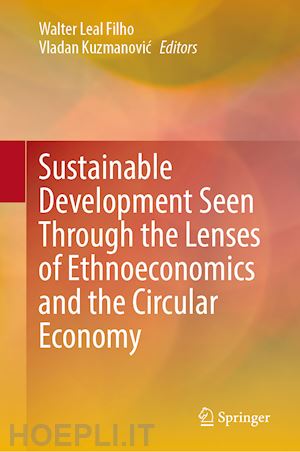
Questo prodotto usufruisce delle SPEDIZIONI GRATIS
selezionando l'opzione Corriere Veloce in fase di ordine.
Pagabile anche con Carta della cultura giovani e del merito, 18App Bonus Cultura e Carta del Docente
This book introduces ethnoeconomics, explaining how cultural, social, and historical factors influence economic behavior and decision-making. The book also delves into the principles of the circular economy, emphasizing the importance of designing out waste, keeping products and materials in use, and regenerating natural systems. It explores how these principles can contribute to sustainable economic growth and resilience. The book also explores how insights from ethnoeconomics can inform and enhance the implementation of circular economy principles, with case studies and theoretical frameworks that showcase the benefits of this integration for sustainable development.
Chapter 1. The Growing Application Potential of Machine Learning in Healthcare Systems of Modernity.- Chapter 2. Maritime Sustainability: Navigating Complex Challenges and Ecological Footprints.- Chapter 3. Exploring the Dimensions of Ethical Consumption, Civic Engagement, and the 4th Industrial Revolution.- Chapter 4. Integrating the Circular Economy into the Surf Industry: A vision aligned with the Sustainable Development Goals.- Chapter 5. Equality, Inequality and Industry 4.0 – Proposing a Theoretical Framework.- Chapter 6. The Role of Ethnoeconomics in Promoting Sustainable Consumption and Production Patterns: A Pathway to Environmental Protection and Economic Prosperity.- Chapter 7. Sensemaking and Sustainability: A Sensemaking Perspective on the Ethical Use of Big Data in Marketing Strategizing.- Chapter 8. Preserving the Past, Building the Future: The Role of Adaptive Heritage Reuse in Achieving SDGs through Tourism.- Chapter 9. Organizational ethnography and anthropology.- Chapter 10. Prosumer Economy in Practice: Building a Community of SMEs With Deepened Circular Supply Networks.- Chapter 11. A review of Consumer Understanding of Green Marketing and Deceptive Green Marketing.- Chapter 12. Dangling Between Frontier Market and Emerging Market, The Demarketing of a Potential African Market: Demographic Implications and the Effects on Sustainable Development.- Chapter 13. Considerations on the socio-ecological management of agrobiodiversity within community tourism.
Prof. Walter Leal Filho (BSc, PhD, DSc, DPhil, DTech, DL, DLitt, FSB, FLS, FRGS) holds the Chairs of Climate-Change Management at the Hamburg University of Applied Sciences (Germany) and Environment and Technology at Manchester Metropolitan University (UK). He directs the European School of Sustainability Science and Research (ESSSR) and the Inter-University Sustainable Development Research Programme, the largest network of universities specifically focusing on research on matters related to sustainable development. Professor Walter Leal Filho has over 30 years of experience on sustainable development 390 research and in excess of 800 publications to his credit.











Il sito utilizza cookie ed altri strumenti di tracciamento che raccolgono informazioni dal dispositivo dell’utente. Oltre ai cookie tecnici ed analitici aggregati, strettamente necessari per il funzionamento di questo sito web, previo consenso dell’utente possono essere installati cookie di profilazione e marketing e cookie dei social media. Cliccando su “Accetto tutti i cookie” saranno attivate tutte le categorie di cookie. Per accettare solo deterninate categorie di cookie, cliccare invece su “Impostazioni cookie”. Chiudendo il banner o continuando a navigare saranno installati solo cookie tecnici. Per maggiori dettagli, consultare la Cookie Policy.